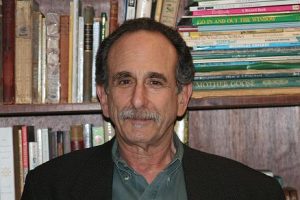Wallace Stevens Joins the Justice League
For William Moulton Marston
I always wanted to be a member of the Justice League,
crusading for the idea of supreme order
in a complacent world,
even if I had to be one of those
“who serve who also stand and wait,”
like Lothar, Mandrake The Magician’s companion,
or Alfred the Butler, in Batman’s cave.
I always wanted to make love to Wonder Woman.
She would come home after a hard day,
peel off those high, red, boots,
those starry shorts and change.
I wouldn’t mind being the house-husband
if she would leave her wonder-bracelets on.
I would give up my position at Hartford Life,
if I could write poems like these all day long.
At night she’d slip off her bracelets
and tell me everything she’d done that day
and I’d get to hear stories you wouldn’t believe,
about the arch-villains– the Cheetah, Angle Man,
the Silver Swan, her paper sweetheart,
the pilot, Steve, foiling Baroness von Guenther
and the Nazis, in the DC comic books,
in the war years of nineteen forty three.
On weekends in my pied de terre in the city
she cooks casseroles of extinct and obsolescent grains,
souvlakis, well-done lamb, and pungent cheese.
She rubs my back after we make love
and sings to me in ancient Greek
from the Orphic and Eleusinian mysteries,
her alto voice refumed in laurel smoke
thickened with wild honey and mare’s milk.
The plays were chanted, Wallace, half-sung, you know.
I get to hear her talking, singing in her sleep.
I can’t disclose, as I gave my word
all the things she told me, but making love with her
was like communications across the species.
an encounter with a Vargas calendar girl–
Rita Hayworth or Dorothy Lamour–
with inside connections to the ancient Greeks.
her skin was cool, supple, a certain
tensile strength, a gravity to her touch.
No subterfuge or guile, she fathomed irony
with the sense of humor of a nun,
despite those tight and starry shorts,
her love was dutiful but sere,
like a sybil, I suppose,
her mind was occupied with other things.
Face up to the chances, Wallace,
she told me once,
You must go out into the world.
Your life is waiting for you it seems
if you can make it so.
Your wild poems will not stand in
for all you want to love.
But I would remain at the window across from the Waldorf,
where through the chill-night reflection of my translucent self,
the city lights display like stars, above a beach,
where Wonder Woman walks by the sea,
trailing her magic lasso in the sand.
From the corner of my eye I see
the bat signal flash over the Gotham night
calling in the Justice League.
I see Superman smiling at me as he squeezes
a chunk of coal into a diamond.
______________________
If you can make it so: title of a book by the poet Haniel Long
Your wild poems…love: Stevens: “the wild poem is a substitute for the woman
one loves or ought to love…”

Ed Frankel divides his time between northern California and Los Angeles, where he has been on the faculty of the UCLA English Dept. Writing Programs since 1982 and adjunct faculty at Antioch since 1991. His poetry has appeared in Fugue, Confluence, The Dogwood Journal of Poetry and Prose, Nimrod, Pedestal, New Millennium Writings and other journals. He was nominated for the Pushcart Best of the Small Presses Poetry Prize 2006. He won first prize in the Confluence 2003 poetry contest, the 2006 Winning Writers War Poetry contest, the 2008 New American Review Chapbook contest, and the 2009 New Millennium Writings Poetry contest. His essay “In the Lap of the Angel of History: A Memoir,” is included in The Farm Worker Documentation Project: Cesar Chavez and the Farm Worker Movement, 1962-1993. His chapbook, When the Catfish Are In Bloom: Requiem for John Fahey, (Finishing Line Press) was recently nominated for The PEN Center USA Literary Award and the California Book Award. His chapbook People Of The Air was recently published by New American Press. Ed’s website is Edfrankel.com
